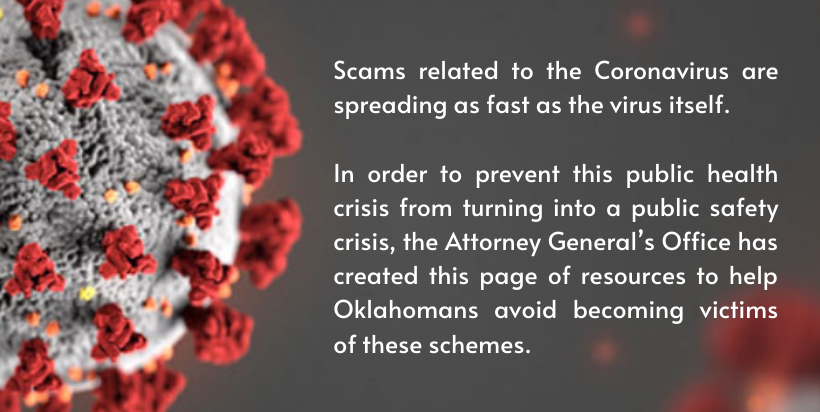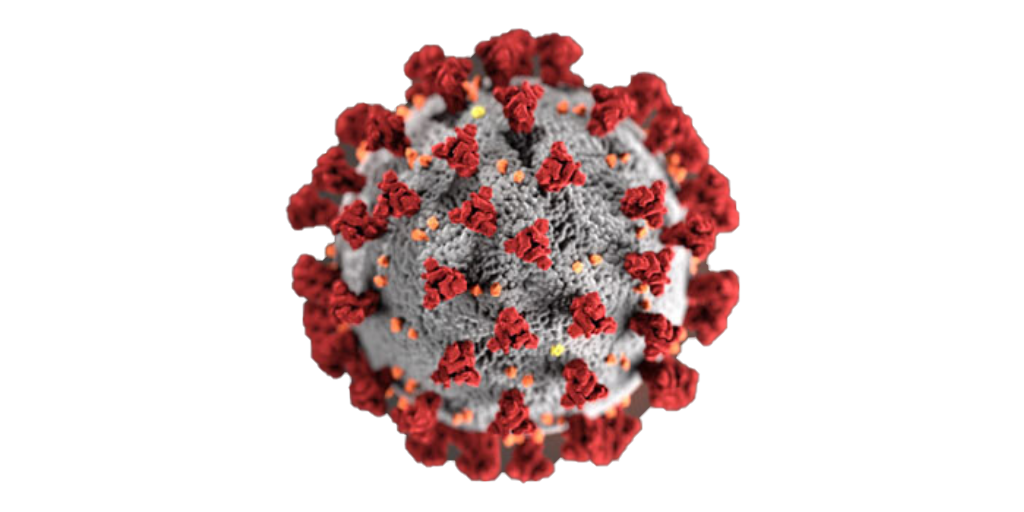
You are here
Coronavirus Fraud Resources
Stopping Unemployment Assistance Fraud
If individuals or businesses receive correspondence related to unemployment claims for which they did not file, click here to complete OESC's new electronic unemployment assistance fraud complaint form.
Be wary of all emails claiming to be from the Centers for Disease Control and Prevention (CDC), World Health Organization (WHO), and other healthcare organizations offering to share information about the virus.
Take extra precaution to avoid spoofed or phony websites by only visiting websites with clearly distinguishable URL addresses. Scammers seek to exploit individuals by directing web traffic to similar, but falsely identified website names where they can provide misinformation or attempt to gain consumers’ personal information or finances in exchange for pandemic updates.
Be on the lookout for emails asking for the verification of personal data, including Medicare or Medicaid information, in exchange for receiving economic stimulus funds or other benefits from the government. Government agencies are not sending emails asking for residents’ personal information in order to receive funds or other pandemic relief opportunities.
Currently, no vaccines, medications, other prescription or over-the-counter products are available to treat or cure the Coronavirus disease. This applies to offers made online, in stores, by electronic message, or over the phone. The U.S. Food and Drug Administration (FDA) has not authorized any home test kits for COVID-19.
As many have seen firsthand, some consumer products are in extreme demand. Household cleaning products, sanitizers, personal hygiene products, and health and medical supplies may be offered via online or in-person sellers aiming to capitalize on under supplied or unavailable products.
When buying online, be sure to research the seller by searching online for the person or company’s name, phone number and email address, plus words like “review,” “complaint,” or “scam.” If everything checks out, pay by credit card as opposed to debit, and keep a record of your transaction.
During this difficult time, while working remotely or responding to a larger volume of phone calls, it may not be feasible for you to reject all unknown numbers.
If you find that you’ve answered a robocall – hang up. Don’t press any numbers or respond to any prompts. Scammers are calling with offers involving everything from COVID-19 treatments and cures, to work-from-home schemes. The recording might say that pressing a number will direct you to a live operator or even remove you from their call list, but it also might lead to more robocalls.
Similar to email phishing scams, text messages from unknown sources may offer hyperlinks to what appears to be automated pandemic updates, or interactive infection maps. These are just two examples of ways scammers can install malware on your mobile electronic device, putting you at increased risk for identity theft and financial exploitation.
Never click links or respond to unsolicited automated text messages. If you receive a suspicious message from an organization with which you do correspond, call or email their public contact information to verify if the message you received is legitimate.
Coming together in a time of need and extreme hardship is testament to the Oklahoma Standard; however, when disasters and life changing events such as the current pandemic occur, be cautious as to where donations are going.
Unfortunately, scammers take advantage of generosity by creating fictitious charitable organizations, seeking fraudulent donations by taking money which could otherwise go to those in need.
Be sure to thoroughly research where a charitable donation is going. Use online tools like Charity Watch or Guide Star to determine legitimacy of the group.
When giving, always do so by credit card or other secure payment processer. Never give by gift card, wire transfer, or other anonymous electronic payment processer.
Misinformation and rumors create panic and disorder. Always fact-check your source, messages, and the businesses you’re engaging with. Never provide personal information or money to those you don’t know without confirming their affiliation.
Many Oklahoma providers have halted power, water and gas cut-offs to residential customers during this time. Be extremely skeptical of any notifications, whether electronic or in-person, claiming you owe payment or your service will cease.
If someone contacts you claiming to represent a utility provider and asking for immediate payment, this is almost certainly a scam. Do not engage, especially do not provide any personal information. Instead directly contact your service provider to discuss details of your account.
Utility operators will not request your bank information or credit card numbers over the phone or door-to-door. You will never be required to pay bills using cash or prepaid debit cards.
The Federal economic impact payments provide much needed relief for those struggling, but create another opportunity for scammers attempting to cash in or steal identities. The majority of individuals who qualify for the one-time payment don’t have to do anything except wait for the money to be deposited in their bank accounts or checks will come in the mail.
Federal agencies will not email or text individuals regarding Coronavirus economic impact payments. If an unsolicited email or text comes from a federal agency with information about the money or anything else related to the Coronavirus, it is a scam that could infect someone’s computer with malware or ransomware.
There is no fee to receive stimulus money. If someone says there is, they are a con artist, and you should terminate the conversation.
No one can expedite payments. Do not trust anyone claiming to be able to perform this service.
Stay updated by visiting the U.S. Department of Treasury at https://home.treasury.gov/, or the IRS at https://www.irs.gov/.
Reports of Fraud and Price Gouging:
Since the president's emergency declaration on March 13, 531 reports of potential fraud or price gouging have been filed with the Oklahoma Attorney General's Office.
Contact Our Office:
Consumer Protection Unit
[email protected]
(405) 521-2029
Other Helpful Links:

